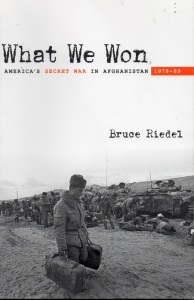Book Review: What We Won by Bruce Riedel
Disclaimer: I received this book as a Goodreads giveaway on the premise that I would review it.
The Soviet Union’s invasion of Afghanistan (1979-1989) was a turning point in history. It was often called the “Russian Vietnam” as the Soviet troops found themselves mired in battle with an enemy that had little structure, struck without warning and enjoyed strong local support. The war drained men and material with little to show for it, and displeasure with the conflict helped bring about changes in the Soviet government that led to the end of the U.S.S.R.
The United States government, working through the CIA, primarily influenced the war by partnering with the Pakistani government to funnel arms and intelligence to the mujahedin who were fighting to free their country from Communism. The author, a former CIA agent, explains who the major players in the war were, what they hoped to accomplish and the outcomes. He shows why this operation worked so well, in contrast to other covert operations such as the infamously botched Iran-Contra deal. In addition, there is some compare and contrast of the Soviet invasion and the current Afghanistan conflict.
There are holes in the story, of course. Several key figures died even before the end of the war, and many others never wrote down their stories. Much of the details of covert actions are still classified by the various governments, and thus off-limits for public consumption. But the author has managed to get quite a bit of new information, including access to Jimmy Carter’s diary of the time. (Since President Carter wrote his memoir while the U.S. aid to the mujahedin was still a secret, his part in setting it up wasn’t in there.)
It begins with a brief history lesson on the many previous foreign invasions of Afghanistan, primarily by the British. Then there’s an examination of the Communist government of Afghanistan, which was fatally divided against itself from the beginning. It introduced much-needed reforms, but, well, Communists, which didn’t sit well with the large groups of strongly religious citizens. When the Communists proved unable to keep from killing each other, let alone control the insurgencies, the Soviets decided to roll in with their tanks, thinking it would be just like Hungary or Czechoslovakia. It wasn’t.
In addition to starting a land war in Asia, the Soviets had three leaders in a row whose health was failing, and a developing problem in Poland that kept them from moving sufficient troops and weapons down into Afghanistan. In addition, it was the first time the U.S.S.R.’s troops had seen serious combat in decades, and they just weren’t up to speed.
Meanwhile, the Pakistani government was rightfully concerned that if the Soviets took over Afghanistan, they might well be next. Especially if Russia could talk their other hostile neighbor India into helping. So they were all too ready to arm the freedom fighters, directly delivering the aid and training provided by funds from America and Saudi Arabia. However, they had very strong ideas about what kind of mujahedin they wanted to support, and their favoritism helped sow the seeds of discord after the war.
Which leads us to the Arab volunteers who came to Afghanistan to fight alongside their Muslim brothers in a jihad against the foreign and officially atheist invaders. At the time, they were only interested in throwing out people who had come uninvited and unwanted. Even Osama bin Laden almost certainly had no clue that in twenty years’ time he’d come to think that crashing airplanes into civilians was a good idea. It’s emphasized that the Arab volunteers had no direct contact with the CIA or other American forces.
The closing section looks at why this particular operation was so successful for the U.S., what happened to the people of Afghanistan after the world turned its eyes away. and how we ended up in the Afghanistan mess we have today.
There are no maps or illustrations, but there are extensive endnotes and an index. The writing is a bit dry but informative, and the writer’s biases don’t get in the way. Recommended for those who wonder what’s up with Afghanistan, and fans of the movie Charlie Wilson’s War


you are quite the reader. I love your desire for knowledge and a good story and your willingness to share it with us. Sounds like an interesting book.
One of the things I’ve learned over the last two years of reading random history books is that there are connections everywhere, little threads in one bit of history that lead to another. For example, quite a few of these books mention Julia Child in one capacity or another. Bet your high school didn’t teach you about the historical importance of The French Chef.
It really surprises me, but I feel like I want to read this book after I read your review. I’m saying I’m surprised because I don’t usually read books about war. When I had to read War and Peace at school I happily skipped the entire war part of the story. But war is such a baffling concept to me that the politics behind it can be interesting and it seems like this book is more about the politics than what was going on on the battlefield.
The author mentions that because of the nature of this war, there were few major individual battles; almost nothing that could be depicted by arrows on a map. The book, yes, is more about the politics than the actual fighting.